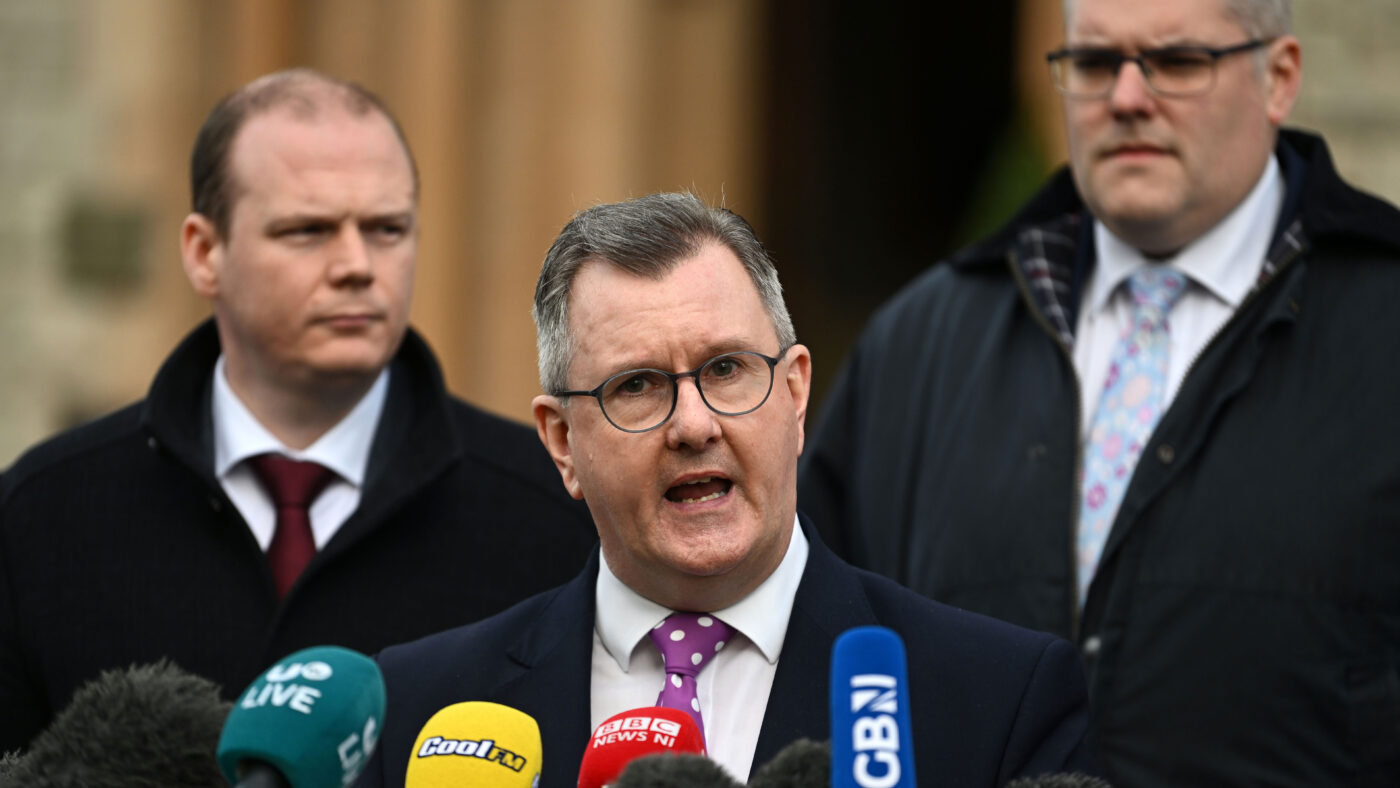For some time, political opponents have suggested that the Democratic Unionist Party is divided bitterly about its strategy for opposing the Northern Ireland Protocol and Windsor Framework.
They imply that many of the DUP’s Stormont MLAs and its leader, Sir Jeffrey Donaldson, are keen to end the boycott of power-sharing in the autumn; while a group of MPs at Westminster, and former deputy leader Lord Dodds, are resisting this change in direction.
The theory that the party is split gained traction this week, after a leaked email in which Donaldson accused some of his colleagues of briefing against the DUP and damaging its electoral prospects, as well as weakening the Union.
It could be that this rebuke was aimed at ‘hardliners’, who insist that the Windsor Framework meets none of the party’s demands, and is intended as a warning that the leader will nonetheless restore the Stormont Assembly in October.
That’s certainly the interpretation that many commentators were keen to endorse. However, it’s a thesis that doesn’t quite hold together.
When a House of Lords’ committee published a recent report that pointed out the many flaws, inconsistencies and deceptions in the Government’s implementation of the Framework, the DUP’s response was headed up by Donaldson’s supposed rival, Lord Dodds.
The peer, who is a member of the sub-committee that produced the document, issued a blistering 1,600-word statement on the party’s website.
‘The report of the House of Lords’ Select Committee,’ he wrote, shows, ‘that the Windsor Framework makes things worse for businesses, compared to what they have experienced up to now’. He concluded that, ‘it is clear that… (the Framework) fails the seven tests set by the DUP’.
This forthright denunciation of the Government did not sound like the work of a party preparing its supporters for a major retreat. And neither was it a solo run. The DUP’s current deputy leader, Gavin Robinson, who is viewed as a loyal ally of Donaldson, followed it up with an equally uncompromising message.
‘The Prime Minister visited Northern Ireland and made commitments during that visit which have never been made a reality,’ he warned. ‘It’s time for delivery. The ball rests at the Government’s foot. A growing pile of broken promises by successive Prime Ministers is part of the problem as trust has been eroded.’
The theory that the DUP would end its Stormont boycott in the autumn was always based on an expectation that the Government would offer the party legislation pledging to protect Northern Ireland’s place in the UK internal market. As the implementation of the Framework continues apace, this premise looks shakier.
The Lords report was just the latest evidence that challenged the Government’s claims to have solved problems with the Irish Sea border. It reflected a growing sense of panic among businesses, as they struggle to glean information about how the new arrangements will work, and discover that, in many cases, the requirements will be more onerous than the status quo.
Indeed, the Government previously provided unionists with legislative assurances about Northern Ireland’s position in the economic union, in the shape of the watered down Internal Market Act of 2020. You may remember that the then Northern Ireland Secretary, Brandon Lewis, caused a furore when he said the original bill would break international law ‘in a specific and limited way’.
The act was amended, after defeat in the House of Lords, but it still committed any ‘appropriate authority’ to take decisions in a way that would maintain Northern Ireland’s place in the United Kingdom’s internal market’ and ‘respect Northern Ireland’s place as part of the customs territory of the United Kingdom’.
This commitment didn’t stop the Irish Sea border operating, or prevent the Government from augmenting it through the Windsor Framework. It looks increasingly unlikely that the DUP could accept a similar blandishment from Rishi Sunak, and return to Stormont on the basis of a promise that may be equally meaningless.
The party is admittedly in a difficult position, because the longer its boycott persists with the sea border in place, the more it looks like failure. Some unionists also argue that preventing power-sharing in the longer term will start to undermine voters’ faith in Northern Ireland’s viability and, perhaps, even cause them to question its place in the UK.
At the same time, many of the most controversial aspects of the Framework are set to be implemented as early as October. If the DUP takes up its ministries beside Sinn Fein, just as the full extent of the beefed up Irish Sea border becomes apparent, then angry voters could take their frustrations out on the party, with a general election coming in 2024.
When Sir Jeffrey Donaldson took up his current role back in 2021, he was its third leader in under a month, ending a bitter, factional struggle that followed Arlene Foster’s time in charge.
Only he will know for definite which of his internal rivals was targeted in this week’s email. It was a rather undignified reminder that Northern Ireland’s largest unionist party is not as united as it likes to pretend, but it does not mean that power-sharing is likely to return to Stormont this year.
Click here to subscribe to our daily briefing – the best pieces from CapX and across the web.
CapX depends on the generosity of its readers. If you value what we do, please consider making a donation.


